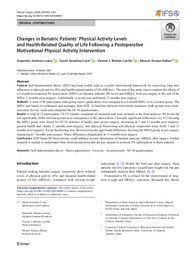Por favor, use este identificador para citar o enlazar este ítem:
https://hdl.handle.net/11000/32942
Changes in Bariatric Patients’ Physical Activity Levels and Health-Related Quality of Life Following a Postoperative
Motivational Physical Activity Intervention
Título :
Changes in Bariatric Patients’ Physical Activity Levels and Health-Related Quality of Life Following a Postoperative
Motivational Physical Activity Intervention |
Autor :
Jiménez-Loaisa, Alejandro 
González-Cutre, David 
Beltrán-Carrillo, Vicente J. 
Alcaraz-Ibáñez, Manuel  |
Editor :
Springer |
Departamento:
Departamentos de la UMH::Ciencias del Deporte |
Fecha de publicación:
2020-03-14 |
URI :
https://hdl.handle.net/11000/32942 |
Resumen :
Purpose Self-determination theory (SDT) has been widely used as a useful motivational framework for improving long-term
adherence to physical activity (PA) and health-related quality of life (HRQoL). The aim of this study was to examine the effects of
a 6-month motivational PA intervention (MPAI) on bariatric patients’ PA levels and HRQoL from pre-surgery to the end of the
MPAI (7 months post-surgery). Additionally, a re-test was performed 13 months post-surgery.
Methods A total of 40 participants undergoing sleeve gastrectomy were assigned to a 6-month MPAI or to a control group. The
MPAI was based on techniques and messages from SDT. At baseline and post-intervention measures, both groups wore accelerometers for one week and completed the SF-36 questionnaire.
Results A total of 32 participants (78.1% female) completed all measures and were included in the final analyses. PA levels did
not significantly differ between groups as a consequence of the intervention. Clinically significant differences (d ≥ 0.5) favoring
the MPAI group were found for SF-36 domains of bodily pain (at pre-surgery, increasing at 7 and 13 months post-surgery),
general health and vitality (7 months post-surgery), and physical functioning and physical component score (both 7 and 13
months post-surgery). Social functioning also showed clinically significant differences favoring the MPAI group at pre-surgery,
increasing at 7 months post-surgery. These differences disappeared at 13 months post-surgery.
Conclusions SDT-based PA interventions could enhance several dimensions of bariatric patients’ HRQoL after surgery. Further
research is needed to understand what motivational processes are key aspects to promote PA participation in these patients.
|
Palabras clave/Materias:
Self-determination theory
Sleeve gastrectomy
Exercise
Accelerometry
SF-36 questionnaire |
Área de conocimiento :
CDU: Bellas artes: Diversiones. Espectáculos. Cine. Teatro. Danza. Juegos.Deportes |
Tipo de documento :
info:eu-repo/semantics/article |
Derechos de acceso:
info:eu-repo/semantics/openAccess
Attribution-NonCommercial-NoDerivatives 4.0 Internacional |
DOI :
https://doi.org/10.1007/s11695-020-04489-1 |
Aparece en las colecciones:
Artículos Ciencias del Deporte
|
 La licencia se describe como: Atribución-NonComercial-NoDerivada 4.0 Internacional.
La licencia se describe como: Atribución-NonComercial-NoDerivada 4.0 Internacional.
 La licencia se describe como: Atribución-NonComercial-NoDerivada 4.0 Internacional.
La licencia se describe como: Atribución-NonComercial-NoDerivada 4.0 Internacional.
.png)
